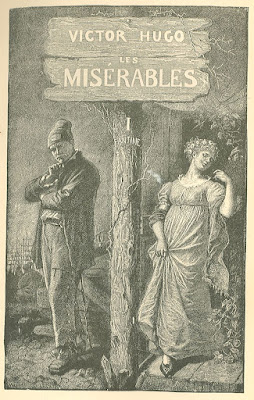Les Misérables
Les Misérables, by Victor Hugo
It's the big ambitious 2024 book, Les Misérables! The book I was most afraid of reading! And I read it all! This was enabled by a) my sister and b) a Substack that posted one chapter a day. It so happens that Les Misérables has 365 chapters, so if you read one chapter a day, you'll get it done in a year.
I was always about as ignorant of Les Misérables as it is possible to be. I saw a local production of the musical once because some friends were in it. So pretty much everyone else in the world knows more than I do, and I won't presume to tell you the plot, but just a couple of things I learned.
I'd always assumed that this story is set during the French Revolution, but it isn't. Jean Valjean is released from prison in 1815, and the story ends in about 1833. The revolt that is the big climax of the story is one of the students of Paris against the government -- an anti-Orléanist demonstration. It gets them all killed, except our hero Marius.
Victor Hugo is famous for his long digressions, which were quite interesting on their own merits, but he does have a talent for putting them in at just the moment you don't want them. Right when you're really involved and everything is very exciting, Hugo decides it's time for a talk about the street urchins of Paris, or the sewers, or the battle of Waterloo. I'm never much on battles, but I did like the gamins and sewers, those are more my style. It really was amazing, though, how just as I was really into whatever was going on, Hugo would drop it and talk about something completely different.
I'm still so abysmally ignorant about French history. It's awful. I don't really know what these students were unhappy about, the Napoleonic wars are a blank, I'm just embarrassingly ignorant about all of it. My sister knows a lot, so I ask her.
I'm really happy that I have now read this huge novel. It was my literary bugaboo, the thing I was most nervous about, and -- thanks to my sister and Project Gutenberg and somebody on Substack -- I can now think of a different book to be afraid of!
The translation I read was a late 19th century one from Frances Hopgood. It's available on Gutenberg or on the above-mentioned Substack feed. You can start now!





I did this too, though with an e-book not an email. That is funny about the timing of the digressions. Did Hugo not think it would make people more likely to skip through them? Or maybe it's less likely, since they are inserted at the places of greatest tension -- one at least skims through them to see if there is anything related to the subject you actually want to know about. I was OK with all of them except Waterloo, that was too much.
ReplyDeleteAnyway, I'm so glad you accomplished this and enjoyed it. French history is confusing, but the human elements still stand out even if history remains obscure.
That's the truth! I'm glad you've done this too. :)
DeleteIt's so interesting he chose the moments of tension to insert his random digressions. Maybe he thought readers would have to slog through all his thoughts if they wanted to get back to the action? That's one way to try to ensure your readers pay attention!
ReplyDeleteAhahaha, I guess so!
Delete